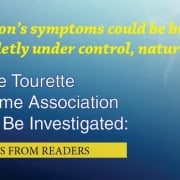Tracking Down Tic Triggers for Tourette Syndrome
Anytime tics increase in frequency, you should ask yourself what is causing this change in symptoms. This approach applies to motor and vocal tics related to Tourette syndrome as well as to chronic tics or transient childhood tics. Tics are indicators that something is out of balance, and your job is to figure out what is behind this bodily reaction with the goal of eliminating or correcting the problem.
Often, you will be able to track the source of tics to foods or environmental exposures, such as inhalant allergens, foods, or chemicals (air fresheners, pesticides, etc.) Yet, it is possible that the trigger is a hidden infection that you will not be able to identify on your own, or a complex immune response; professional help is often required. At the same time, astute and determined families often find the answers they need through systematic and patient observations.
Karen, a concerned mother, shared her experience about how her family discovered that corn consumption was the key player in her child’s severe Tourette syndrome tics:
My son John is going into sixth grade and has displayed motor and vocal tics for three years. Teachers would tell him to stop his humming, sniffing, or other tics but John would reply “I can’t stop it.”
One day after he went to the movies and had some popcorn, I noticed he started sniffing and clearing his throat, nonstop. I’d always suspected allergies were involved with John’s periodic humming or sniffing, and I began trying to keep him away from popcorn because of this episode.
I avoided feeding him corn at home, but sometimes he had it outside the house. Then his allergy doctor tested him and found he was allergic to mold, trees, and cat — but not corn! After this, I started buying whole corn again, assuming it was safe. My son’s Tourette symptoms were trigged intensely on numerous occasions after eating whole corn. At times John couldn’t breathe without humming or sucking in air loudly. It was so difficult for him. His body would jerk and his eyes kept blinking. I didn’t know how he could even read in school.
I told John I wanted him to stop eating corn, but he insisted it didn’t affect him. Yet, every time he’d eat whole corn his symptoms would explode. Eventually he had to experience this for himself, by eating corn and watching what happened. He’d show no real signs while eating the corn and actually seemed to improve a little, briefly. Then hours later, his symptoms would explode with him humming, sniffing, sucking in air loudly (whooping sound), and blinking. He finally realized that whole corn was causing his problems.
Since then he hasn’t touched whole corn and he’s been virtually symptom free. Corn oil in foods doesn’t really seem to bother him. Popcorn clearly triggers his symptoms. Corn tortilla chips cause him slight tics, but it’s not severe enough for him to want to stop eating them. Yet when he ate whole corn, it caused him to have severe tic symptoms that could last up to two weeks.
Remember: Allergy Testing Isn’t Perfect!
As the above account demonstrates, allergy testing isn’t always going to give you the full picture on sensitivities. There are a number of reasons for this, including the fact that different types of allergists use different methods of testing. The gold standard for food allergy/sensitivity detection is to completely avoid all foods containing a specific suspected item (such as milk, or corn) for a period of four to seven days. Then, plan to eat a significant amount of the food during one day and watch for reactions. It is advisable to do this test in the presence of a physician in case a severe response occurs.
Your own experience is the best guide, coupled with professional advice. In most cases there is not one single factor affecting the nervous system. In the case highlighted by John’s mother, other allergens identified– mold, trees, and cat—were likely also playing a role. Multiple culprits makes it more difficult to pinpoint problems.
To assist in the identification process, see our helpful book: Tourette Syndrome: Stop Your Tics by Learning What Triggers Them.









